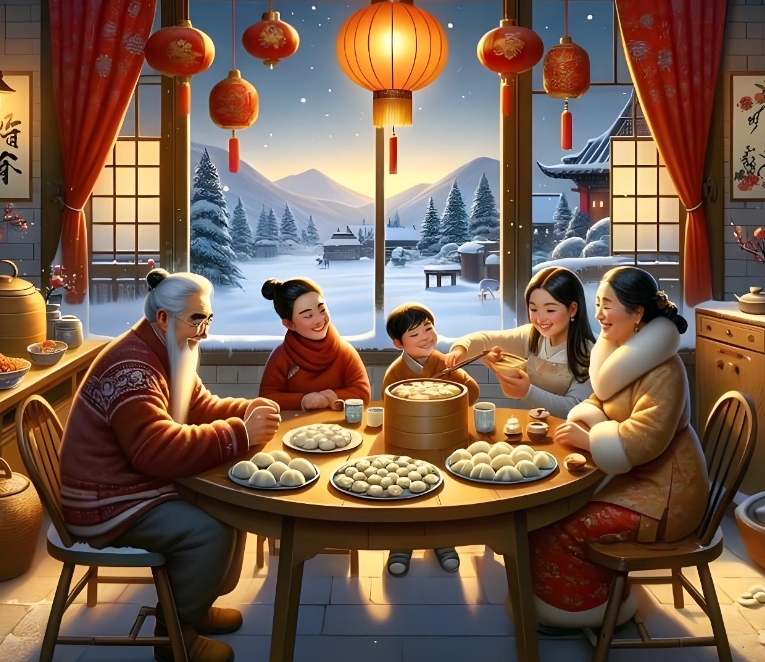Warm stove meeting
After the frost falls, the cold air has become heavy, so the opening date of furnaces in various places is usually in the early tenth month of the lunar calendar. The “Annals of Jingchu” records: “In the White Deer Cave of Mount Lu, wandering scholars gather together to prepare for the cold every winter. They gather in the Wushi area of the Golden Market, known as the Black Gold Society. On the Dan day of October, wine is ordered as a warming ceremony.” Generally, in Beiping, on the first day of October, a warm kang is heated and a surrounding furnace is set up, known as the opening ceremony. The heating ceremony is not removed until the first day of February of the following year. Heaters are often built using a non ash mineral that is resistant to combustion. This material is whiter than alumina, light and warm, and sturdy. Later, thin iron was used to make heaters. The “Sui Shi Za Ji” records that on the first day of October, people in Beijing would drink alcohol and grill large pieces of meat in the stove, surrounding the stove while drinking and eating, which is called the “warm stove”.
The Book of Rites and Monthly Ordinances records that there will be a heating ceremony in October. Kunshan in Jiangsu, Taiping in Anhui, Zhongxiang in Hubei, and other places also start using fire to keep warm at the beginning of the month. During this period, there are people selling cakes and pastries for food or holding warm-up parties for drinking.
Picking mulberry leaves
Mulberry leaves are bitter in nature, sweet and cold in taste, capable of dispelling wind, clearing heat, cooling blood, and improving vision. They are best grown in age and have strong qi and energy. At this time, it is already the cold winter, and with the autumn’s killing spirit, mulberry leaves can better relieve liver and gallbladder stagnation and heat. The “Guangji Formula” states that 120 mulberry leaves should be harvested on the winter day, and in leap years, an additional 10 leaves should be harvested, with 10 leaves used each time. On days when you need to wash your eyes, using mulberry leaf decoction to wash your eyes can treat various eye diseases. Other methods such as (Puji Fang) and (Jijian Fang) have recorded the use of mulberry leaves to treat conditions such as green blindness, teary eyes, and redness and pain in the eyes.

Eating lamb meat
Lamb meat is sweet in nature, hot and belongs to the category of fire. It can nourish the element and promote yang, treat physical weakness and thinness, keep warm and invigorate qi, relieve anxiety and shock, and has a strong nutritional effect. Lamb meat tastes particularly delicious after autumn and winter. In China, except for sleeping outside the Great Wall, such as Inner Mongolia, Xizang and other places, mutton is generally eaten in late autumn until the beginning of spring. In places like Changxing in Zhejiang, stores are already set up in the eighth lunar month, where sheep are slaughtered and sold. There is a folk saying that goes, ‘On the first day of the month, a sheep will be attacked.’ It didn’t stop selling until after New Year’s Eve. Along the the Taihu Lake Lake basin, sheep abound. During the winter season, lamb is also a seasonal delicacy. The “Brief Scenery of the Imperial Capital” states that during the Ming Dynasty, sheep began to be sold in Beijing in October of the lunar calendar. Lamb meat has a warm aroma and is good at tonifying deficiency. The Compendium of Materia Medica once referred to lamb as “ginseng” in parallel, and Zhang Zhongjing used Danggui lamb soup to treat symptoms of fatigue. The colder the weather, the better it is to eat lamb. Generally, there are various methods such as braised lamb, white lamb, lamb joints, lamb dumplings, lamb tripe soup, and fried lamb trotters. The roast mutton of Zhengyanglou in Beiping and the Yangqing of the Taihu Lake Lake in western Zhejiang are particularly popular. If it’s spring and the weather is already warm, sheep are prone to gnawing on poisonous grass, which is not suitable for consumption.
Repairing agricultural tools
In the middle of winter, when farming is over, farmers should inspect and repair all agricultural tools during their leisure time. If any damage or unusable items are found, they should be repaired or replaced immediately to avoid delaying the farming season in spring. In the “Book of Rites: Monthly Ordinances,” there is a description of the month of Jidong, which “instructs farmers to set aside their farming plans, cultivate crops, and use tools for farming. That’s exactly what was said.
Fertilizer making
All kinds of plants, except for those that grow in swamps, rely on their roots to absorb nutrients from the soil to sustain their lives. In the uninhabited mountains and fields all year round, trees are particularly lush and thriving, relying on the self generated dead branches and leaves of plants and trees, which accumulate over time to form fertilizer. In winter, plants and trees wither, and in areas close to forests or homes with gardens, dead branches and leaves are everywhere. This is the best time for farmers to produce compost.
Sending cold clothes at the beginning of winter
On the day of the beginning of winter, people also prepare clothes for their ancestors living in the underworld, that is, giving them cold clothes. According to the “Brief Introduction to the Scenery of the Imperial Capital”, there are specialized paper mills that use colorful paper to cut out clothes of different genders that are over one foot long. My family bought it and burned it at the doorstep, muttering to me, ‘Please come and fetch it from our ancestors, and ask for a cold coat as a gift.’.
Eat dumplings
In ancient China, there was a custom of “Winter Solstice Festival”, which is also known as “celebrating the New Year” in some places. In northern China, especially in Beijing and Tianjin, people love to eat Lou Gua dumplings. In the beginning of winter, there are very few fresh gourds on the market, and most of the gourds people eat are bought in the summer. People put the fresh gourds they buy back in small houses or on windowsills, and after a long period of saccharification, use them as dumpling filling. The taste is different from fresh gourds and Chinese cabbage, and it tastes better when mixed with vinegar and garlic.



